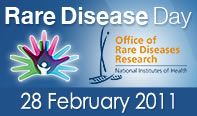Last updated: February 28, 2012
Rare Disease Day 2011
Rare Disease Day 2011
Patients and Researchers, Partners for Life
 The National Human Genome Research Institute will help raise the awareness of rare diseases by observing Rare Disease Day on Monday, Feb. 28, 2011, as it participates in a daylong symposium on the disorders. The event is coordinated in the United States by the National Organization for Rare Disorders and is supported in part by the NIH Office of Rare Diseases Research. This year's theme is Alone we are Rare. Together we are Strong.
The National Human Genome Research Institute will help raise the awareness of rare diseases by observing Rare Disease Day on Monday, Feb. 28, 2011, as it participates in a daylong symposium on the disorders. The event is coordinated in the United States by the National Organization for Rare Disorders and is supported in part by the NIH Office of Rare Diseases Research. This year's theme is Alone we are Rare. Together we are Strong.
Nearly 30 million Americans are affected by one of 7,000 rare diseases. About 80 percent of rare diseases are genetic in origin and about 75 percent affect children. Rare diseases can be chronic, progressive, debilitating, disabling and life-threatening. Information is often scarce and research is usually insufficient. People affected face numerous challenges, such as delays in obtaining a diagnosis, misdiagnosis, psychological burden and lack of patient and family support services. The goal of rare disease advocates is to obtain for patients the highest attainable standard of health and the resources required to overcome common obstacles in their lives.
Rare Disease Day at NIH (RDD@NIH)
On February 28, 2011, the National Institutes of Health (NIH) will celebrate the 4th annual Rare Disease Day with a daylong symposium focused on various rare diseases research supported by the NIH Office of Rare Diseases Research, the NIH Clinical Center, NIH institutes and centers, the Health Resources and Services Administration (HRSA), the Food and Drug Administration's Office of Orphan Product Development (OOPD), the National Organization for Rare Disorders (NORD), and the Genetic Alliance.
Rare Disease Day at NIH (RDD@NIH) will be held in the Lipsett Amphitheater from 8:30 a.m. to 5:15 p.m. In addition to the various scheduled talks, there will be posters and exhibits from many groups involved in the rare diseases research community. Attendance is free and open to the public. In association with the Global Genes Project, all attendees are encouraged to wear their favorite pair of jeans. You can view the agenda here![]() While attendance is free, NIH would like to know how many people are planning to attend. If you would like to attend, please register here. If you would like to display a poster or exhibit, please contact Dr. David J. Eckstein at eckstein@od.nih.gov for more information.
While attendance is free, NIH would like to know how many people are planning to attend. If you would like to attend, please register here. If you would like to display a poster or exhibit, please contact Dr. David J. Eckstein at eckstein@od.nih.gov for more information.
All NIH visitors should visit the NIH Visitors and Security Web page for the latest instructions and updates. Please give yourself adequate time to move through security.
Sign language interpreters will be provided. Individuals with disabilities who need reasonable accommodation to participate in this event should contact Kimberly Potter at kpotter@icfi.com or 301-251-4962 or the Federal TTY Relay number at 1-800-877-8339. Requests should be made at least five days in advance of the event.
NHGRI Information and Resources about Rare Diseases
For Students, Teachers, Patients and Families, and Researchers and Healthcare Professionals
Genetic and Rare Diseases Information Center (GARD
Established by NHGRI and the NIH Office of Rare Disease Research, GARD was established to help people find useful information about genetic conditions and rare diseases. The center is staffed by experienced information specialists to answer questions in English and Spanish.
Frequently Asked Questions About Genetic and Rare Diseases
Find out about genetic and rare disorders, genetic testing, genetic counseling and evaluation, and more.
Rare Disease Research Involving NHGRI Researchers
NIH Therapeutics for Rare and Neglected Diseases (TRND) [trnd.nih.gov]
Launched in 2009, NIH's TRND project, which involves NHGRI researchers, is the first integrated, drug development pipeline to accelerate the production of new treatments for rare and neglected diseases.
NIH Undiagnosed Diseases Program [rarediseases.info.nih.gov]
NHGRI clinical researchers play a prominent role in this NIH clinical research program that aims to provide answers to patients with mysterious conditions that have long eluded diagnosis. The Undiagnosed Diseases Program, focuses on the most puzzling medical cases referred to the NIH Clinical Center in Bethesda, Md., by physicians across the nation.
Specific Genetic Disorders
More information on specific genetic, orphan and rare diseases.
Find out more about Rare Disease Day and how YOU can get involved.
- Visit NORD's Rare Disease Day Web site [rarediseaseday.us]
- Visit the NIH Office of Rare Diseases Research Rare Disease Day Web page [rarediseases.info.nih.gov]
Last Reviewed: February 28, 2012